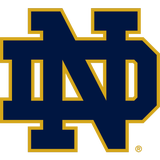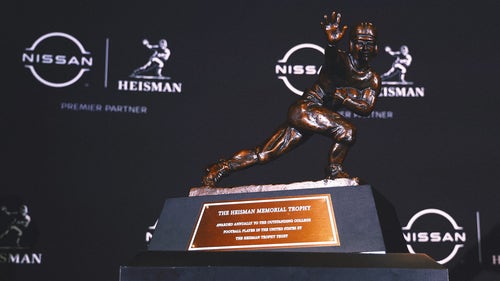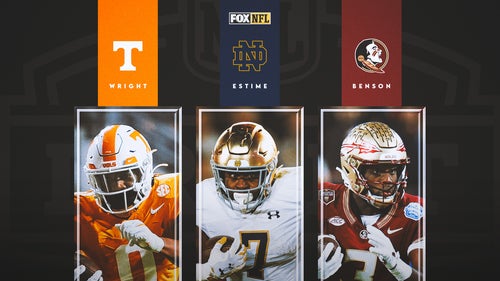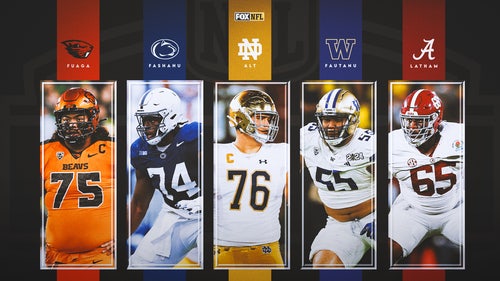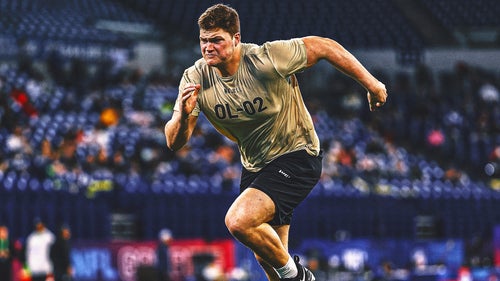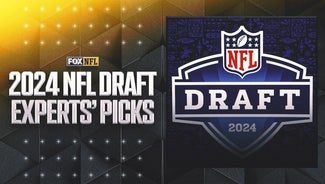
Brian Kelly explains how he plans to bring Notre Dame back to prominence
SOUTH BEND, Ind. — At 7:30 a.m. on a recent Thursday, Brian Kelly pushes aside his office coffee table and rolls up the area rug.
In the back closet of his sprawling coach’s office at Notre Dame, Kelly grabs an oversized black Lululemon yoga mat and unfurls it in the vacated space. His private yoga teacher, Roxie Sweikar, rolls out her smaller mat parallel to Kelly.
Sweikar leads Kelly through an intense hour-long vinyasa yoga session, an up-tempo free-flow workout that includes a supported handstand. By the end, Kelly’s navy Under Armour shorts and gray T-shirt are damp with sweat. He has shed 15 pounds and a pants size since December, undergoing one transformation while plotting another.
The changes at Notre Dame in the wake of a 4–8 season, just the second losing season of Brian Kelly’s 26 years as a head coach, transcend deep breaths and slimmer waistlines. The Fighting Irish sputtered on offense, fired their defensive coordinator mid-season and looked generally discombobulated on special teams. The intangible problems may have been more vexing, as seven of the Irish’s eight losses came by one score. Kelly blames himself for lapses in mental toughness, physical conditioning and general accountability. “Part of the whole culture,” he says, “I let slip up.”
After Notre Dame’s blowout loss at USC to close last season, Kelly found himself in a surreal spot. A coach who spent a quarter century cementing his reputation as one of college football’s consummate program builders suddenly had to step back and figure out a way to rebuild his own. It was if the crew from HGTV’s Fixer Upper discovered its own home collapsing.
To rejuvenate the Irish on the field, Kelly orchestrated a complete overhaul of his staff, program and, most significantly, himself. There’s a new offensive coordinator, defensive coordinator, special teams coach and strength coach. In total, he hired 17 new staff members in the football staff. “We failed and I failed,” Kelly told Sports Illustrated in his office last week. “I think like any successful person.… They don’t say I’m a failure. I looked at what adjustments needed to be made.”
In an unusually candid interview, Kelly didn’t just fall on the sword for the Irish’s flop last season. He belly flopped on it, using some form of the word fail nine times and consistently pointing the finger back at himself. Antithetical to his red-faced and fiery sideline demeanor, Kelly underwent a thorough and deliberate overhaul of the program.
The adjustments came directly from feedback Kelly received when he interviewed 93 players after the season. Former receiver and student coach Corey Robinson saw a “lack of professionalism” and “undisciplined” habits from players. Senior captain Mike McGlinchey pointed out “the finishing and training of our team got a little stale.” Senior walk-on Grant Hammann suggested Kelly needed to be around the team more. Their answers, apologies, complaints and suggestions provided the blueprint to fix a program that felt too corporate, a coach who’d grown too distant and a missing intensity in the weight room. “There wasn’t a spark and attitude around our building,” says McGlinchey, “of guys wanting to compete and wanting to win.”
With spring practice starting Wednesday, the most significant changes at Notre Dame have come from Kelly himself. He’s divorced himself from the day-to-day running of the offensive staff—no small adjustment for an offensive guru—and gotten back into the daily lives of his players. He’s there encouraging them in the weight room every morning at 6 a.m., eating breakfast with them daily and hanging around the locker room to chide them to put their cell phones away.
In other words, Kelly took a deep breath and changed nearly everything. “If you think about the why, and why we’re doing this, it’s a lot clearer,” he says. “Why did we do this? Why did we go through all this? Why did we hire all these new coaches? We did it because there’s a tradition of excellence that I need to live up to. Period. I didn’t live up to it, and I’m going to make sure that never happens again.”
*****

After every season, Kelly and athletic director Jack Swarbrick sit down to evaluate the program. The conversation is a longer version of an ongoing dialogue that takes place during the season. Some years, they’ll meet at the National Football Foundation event in New York City. This year’s meeting took place at Swarbrick’s house and lasted eight-and-half hours. “He very much came into that meeting,” Swarbrick says, “committed to major change.”
The first changes came to the Fighting Irish staff. The Irish will begin next season with five of nine new position coaches and three of five new strength coaches. This proved the most painful part for Kelly. Assistant head coach Mike Denbrock, who’d been the primary play caller, left for Cincinnati after being informed he’d have a lesser role in the offense. Notre Dame parted ways with defensive line coach Keith Gilmore. Strength coach Paul Longo, perhaps Kelly’s closest confidant, took a leave of absence from the football program. In total, those three coaches accounted for a combined 35 seasons working for Kelly. Denbrock even stood in Kelly's wedding. “The most difficult [decisions] I’ve ever had to make in my 26 years,” Kelly says, “These coaches literally were part of building your program to get you where you are today. To make those changes, which were necessary, are gut-wrenching.”
Perhaps the most consistent piece of feedback Kelly received from the players who came through his office was that they wanted him around more. After VanGorder’s firing in September, Kelly recalled defensive players remarking how invigorating it was to have Kelly’s presence on that side of the ball. He viewed it as a backhanded compliment, as it meant they’d missed his presence. “[Players] told him that his interaction was too limited because his focus on the quarterbacks and the offense, so he came out of those conversations very focused,” Swarbrick says. “If his goal is to touch more of the kids and have more contact, what are the tools available to do that?”
That notion guided the whole hiring process. Chad Klunder, the program’s associate athletic director for football operations, joined Swarbrick and Kelly for the final two-and-a-half hours of their marathon postseason meeting. He jotted down on paper what Kelly and Swarbrick discussed and began the on-the-ground process of vetting, recruiting and setting up interviews with potential coaches. A holistic interview process was stressed, much different than the shotgun assistant coach hiring practices so common in college football. Notre Dame interviewed five strength coaches, three wide receivers coaches, three offensive coordinators and two defensive coordinators. “I was working with Brian to make sure Brian was getting what he wanted and that Jack’s vision and expectations were being met,” Klunder says. “I really served as a conduit between the two of them.”
Defensive coordinator Mike Elko’s hire from Wake Forest is regarded as the home run coordinator hire of the off-season, as the Demon Deacons finished No. 20 in scoring defense last season. Elko is tasked specifically with getting young talent on the field faster, something Kelly explicitly points out hadn’t happened well enough the last three years.
The hiring of Chip Long, a 33-year old offensive coordinator from Memphis, empowers Kelly to take on more of a CEO role. Allowing Long to call plays and run the day-to-day offense came down to comfort in letting go. Kelly watched film of Long’s offenses and saw the faster tempo he desires and a play-calling kindred spirit.
Bringing ex-Nevada coach Brian Polian, a former Irish assistant, back to run special teams gives those units a proven leader and clearer identity.
And by working in lockstep with Kelly to oversee these changes, Swarbrick sent a clear message of the university’s commitment to Kelly and the program’s success. With Kelly likely to enter the season shrouded by speculation about his job security if the Irish have another poor season, Swarbrick’s backing of his coach encompassed 17 new hires and multi-year deals for three new coordinators, two new position coaches and a strength coach. “I get all the hot seat stuff, but you don’t take the approach we took and the investment we made unless you believe you can succeed,” Swarbrick says. “And you know, Mike [Elko] doesn’t come here or Chip [Long] doesn’t come here. We believe very strongly that these changes will have a significant impact.”
*****

A few weeks ago, Kelly ordered his usual breakfast of an egg white omelet with spinach and feta. He sat down at the daily team breakfast table with Hammann, the senior walk-on who happened to order the same thing. That sparked a conversation, something that Hammann says he’s had a lot more of with Kelly since last season ended.
Sheepishly, Kelly admits that last year he may not have been able to recognize Hammann if he walked by him in the hall. Hammann says Kelly was around infrequently enough that “you’d kind of get nervous” in his presence. That’s changed drastically, as Kelly can now rattle off where Hammann is from (Iowa), where he’s working after graduation (Stryker) and where his girlfriend lives (Seattle). Hammann admits he’d forgotten that he and Kelly shared a breakfast order, a sign of how much interaction they’ve had. “It just seems normal now,” Hammann says. “Now it’s kind of like seeing a friend. He’s taken the time to get to know each of us on a personal level.”
Kelly’s priorities shifted significantly this offseason. Coming up through the ranks at schools like Grand Valley State and Central Michigan, the limited infrastructure required him to run the offense and have his hands everywhere else. With a staff of 48, that’s not still the case. “We like the changes we’ve seen from coach Kelly,” says McGlinchey. “We’ve always known he’s a great guy, and more of the day-to-day interactions have been extremely valuable for everyone on our football team. Having normal conversations with him builds trust and relationships.”
As Kelly grew distant, a program that adores its tradition had become corporate. Players didn’t walk into the stadium in unison on game day. Some didn’t even know the alma mater. “So many players said they came to Notre Dame because they love the tradition of Notre Dame, and it impacted me,” Kelly said. “It’s gotta be collegial here, can’t be about the six guys that all went to the NFL and the first-round draft picks and $52 million in signing bonuses, it can’t be about that.”
Some of the best information about the issues in the program came from walk-ons like Hammann. About 20% of the team is comprised of walk-ons, and they didn’t hold back in the interviews. “Because you’re on your way to med school, Brian Kelly isn’t controlling your future,” Swarbrick says with a chuckle.
Kelly admits he did a poor job developing leaders, as early defections to the NFL thrust unprepared players into the role. So Kelly overhauled the captain selection process, with seven captains being chosen immediately after the season instead of during summer camp. Kelly also named senior receiver Austin Webster the first walk-on captain in the program history.

The entire offseason has been restructured, starting with locker location. Instead of being grouped by position, the players are scattered at random. Each section of the locker room is organized into eight neighborhoods, with young players Kelly has earmarked as potential future captains titled “neighborhood bosses.” Essentially, Kelly started a captains training program.
He and new strength coach Matt Balis also ratcheted up the competition, with the entire team broken up into eight teams and an off-season scoreboard kept on things like weight room performance, academics and community service.
There’s an intricate point system, with teams docked points for things like poor locker cleanliness, something Kelly admits took a huge backslide compared to his first year. And Kelly reserved the right to stop any player and make him sing the alma mater on the spot; missed lyrics mean a team loses nearly 30% of its points. So far, 25 Irish players haven’t missed a note. “We’ve seen great improvement in the way guys come to work and where the focus is shifted,” McGlinchey says. “Guys understand what’s on the line if they don’t do things the right way. There’s been a dramatic improvement in that regard.”
Without a snap of spring ball played, the most noticeable changes have come in the weight room. Kelly admits too many “accommodations” were made for players, which led to a collective slip in physical and mental toughness. Kelly points the finger at himself for allowing the culture to get there. In his interviews, the players noted a consistent desire to want to be pushed and challenged more. Coming into last season, Notre Dame won 21 games by seven points or fewer in Kelly’s tenure. Last season, they lost seven and won just one one-score game. “You don’t have to be a rocket scientist to figure out you are missing something,” he says. “We were missing that component, that mental performance component.”
How the revived energy and competitiveness in the weight room translates to the fourth quarter will ultimately be the measure by which Balis is judged. McGlinchey credits Balis for resuscitating the program’s juice, as stale has become spirited. “We didn’t have the mindset or ability to keep our foot on the gas pedal,” he says. “There wasn’t a spark and attitude around our building of guys wanting to compete and wanting to win.”
*****
Notre Dame’s 2017 won-loss record will prove the final referendum on all of Kelly’s changes. Along with the intangible signs of energy and optimism, one of the tangible signs of the overhaul at Notre Dame comes with a 10-member recruiting class for 2018 that’s ranked No. 3 by Scout.com. Kelly is optimistic enough that he considers Notre Dame “a lot closer” to winning a national title in terms of the Irish’s depth and talent “than we were in 2012 when we played Alabama.”
The general view of Notre Dame entering 2017 may be more skeptical, but few can downplay just how significant Kelly and the program have changed in less than three months.
“My ego does not need to be satiated in any shape or fashion,” he says. “I want to win for Notre Dame. That’s why I did this and made the tough decisions that I made. If I wanted to call the offense, I would’ve just kept those guys and said, ‘Hey move over I’m coaching.’ I want to win for Notre Dame and that’s why I made these decisions.”
This article originally appeared on
